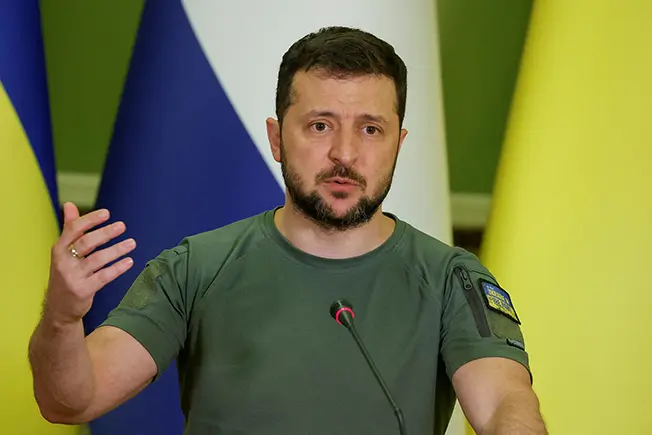President Volodymyr Zelenskiy urged Ukrainians to be vigilant ahead of Wednesday’s celebrations to mark 31 years of independence from Soviet rule, as fresh blasts hit Crimea and a missile wounded 12 civilians near a nuclear power plant.
Ukrainians must not allow Moscow to “spread despondency and fear” ahead of the Aug. 24 events, which also come six months after Russia began its full-scale invasion of Ukraine, Zelenskiy said on Saturday.
“We must all be aware that this week Russia could try to do something particularly ugly, something particularly vicious,” Zelenskiy said in nightly remarks on video.
Curfew in Ukraine’s second-largest city, Kharkiv, is to be extended for the entire day on Wednesday, said regional Governor Oleh Synehub. The curfew usually runs from 10 p.m. to 6 a.m. in the northeastern city, regularly hit by Russian shelling.
“Remain at home and take heed of warnings!” Synehub wrote to residents on the Telegram messaging app.
Also on Saturday, a Russian missile hit a residential area of a southern Ukrainian town not far from a nuclear power station, wounding 14 civilians, Russian and Ukrainian officials said.
The strike at the Pivdennoukrainsk (South Ukraine) nuclear station and fresh shelling near the Zaporizhzhia station, Europe’s largest, revived fears of a nuclear accident, Ukrainian officials said.
Zelenskiy in his speech also referred obliquely to a recent series of explosions in Crimea, the Ukrainian territory Russia annexed in 2014.
Ukraine has not claimed responsibility for the attacks, but analysts have said at least some have been made possible by new equipment used by its forces.
“You can literally feel Crimea in the air this year, that the occupation there is only temporary and that Ukraine is coming back,” Zelenskiy said.
In the latest attack in Crimea, the Russian-appointed governor, who is not recognised by the West, said a drone had struck a building near the headquarters of Russia’s Black Sea fleet on Saturday morning.
“A drone flew onto the roof. It was flying low,” Mikhail Razvozhayev said on Telegram. “It was downed right over the fleet headquarters. It fell on the roof and burned up. The attack failed.”
Razvozhayev said the region’s anti-aircraft system had again been in operation and asked residents to stop filming and disseminating pictures of how it was working.
Ukrainian media reported explosions in nearby towns, among them the resorts of Yevpatoriya, Olenivka and Zaozyornoye.
CHILDREN AMONG THE INJURED
Following the strike near the South Ukraine power station, Vitaliy Kim, governor of Mykolaiv region, said on Telegram that four children were among the wounded.
Private homes and a five-storey apartment block were damaged in Voznesensk, 30 km (20 miles) from the plant, Ukraine’s second-largest.
Updating a toll, authorities in the Ukrainian military’s south district said 14 civilians had been wounded.
The attack on Voznesensk was “another act of Russian nuclear terrorism,” said state-run Energoatom, which manages Ukraine’s four nuclear energy generators.
“It is possible that this missile was aimed specifically at the Pivdennoukrainsk plant, which the Russian military tried to seize back at the beginning of March,” it said in a statement.
Russia did not immediately respond to the accusation. Reuters could not verify the situation in Voznesensk. There were no reports of damage to the South Ukraine plant.
Russia and Ukraine traded fresh accusations of shelling around the Zaporizhzhia station, held by Russia since March.
Vladimir Rogov, a Russia-appointed official in the nearby town of Enerhodar, said Ukrainian forces had launched at least four strikes on the plant.
Yevhen Yetushenko, mayor of Ukrainian-controlled Nikopol on the opposite bank of the Dnipro River, said Russian forces had repeatedly shelled the town.
Talks on arranging a visit to the Zaporizhzhia plant by the United Nations’ nuclear agency have stretched more than a week. Ukrainian authorities have urged the U.N. and other global bodies to force Russian forces to leave the plant.

